BLOG: Post Long Run Q & A's with Ryan Caturan
You’ve made it! The end of mileage building for training. If you’re running the Chicago marathon, chances are you ran your last long run, the 20-miler, this past weekend! Congratulations to getting here. Now what? We interviewed Ryan Caturan, one of the coaches from Chicago Endurance Sports and Director of Community Partnerships for Aligned Modern Health on some commonly asked questions for new and experienced runners getting ready for the Chicago Marathon.
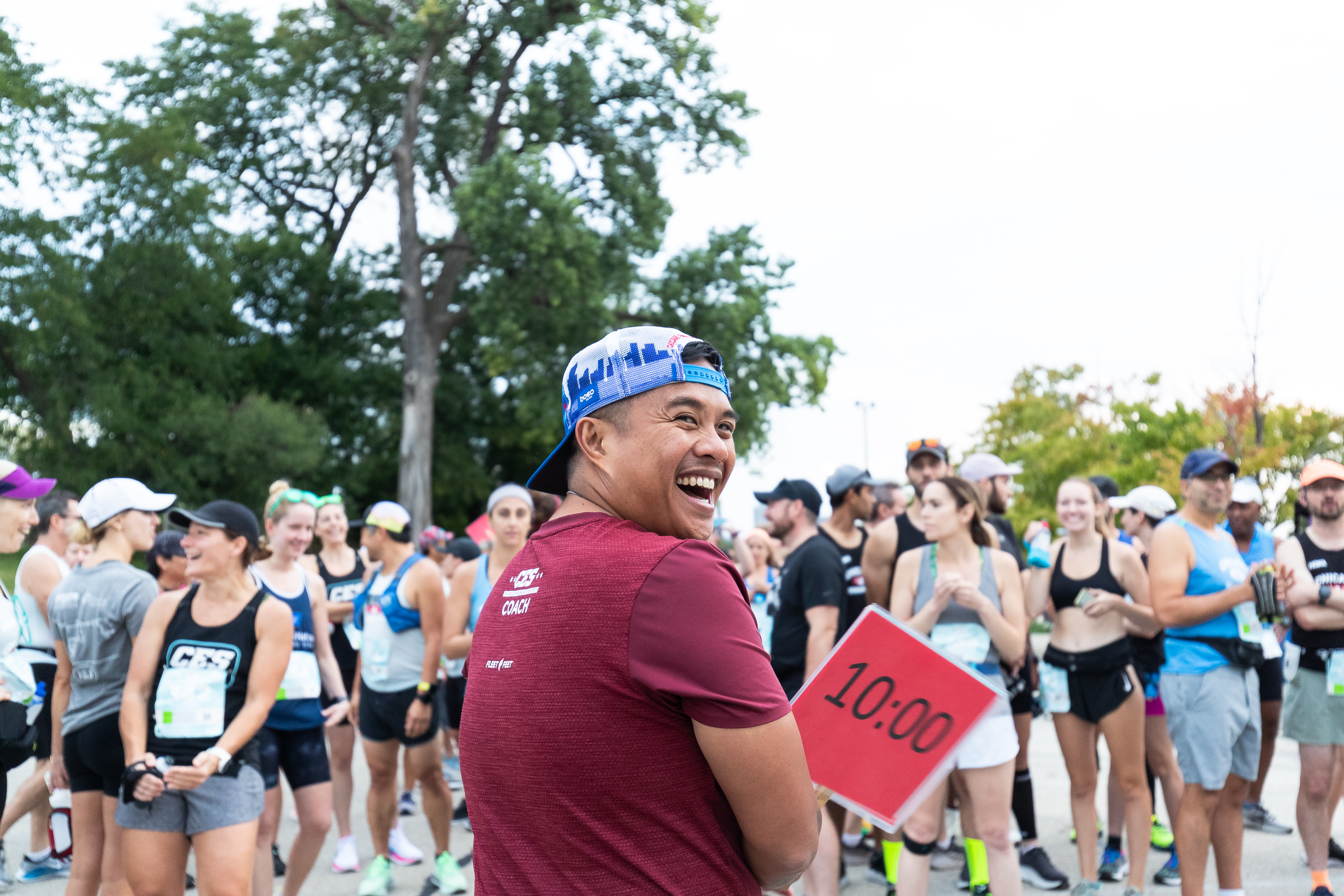
Q: What happens if the 20-miler didn’t go as well as one would like?
- First off, congratulations to everyone who made it through training! That means you made it through roughly 16 or so weeks of training. That’s the real challenging part. We like to say sometimes, the marathon is just 26.2 miles of celebration from all the weeks of training. Some of you had a great day. I’m so happy for you, you put it all together! Now, don’t change a thing.
- There is probably a good amount of people who did not have the greatest of training days, and that’s 100% okay! Be honest with yourself and consider what could’ve possibly gone wrong? How did you sleep all week? What did you eat all week? Foods can cause reactions up to 72 hours after consumed. Were you on your feet a lot this week? How was your hydration all week? Were there extra stresses this week? Notice I’m asking how your week went. It’s more than just what could’ve happened the day of or day before.
- How did your nutrition plan go on the 20-miler? If you took everything and on time (say every hour) but still felt like you bonked, maybe you need to consider taking your nutrition closer, like every 45 minutes.
- When things got tough, were you hard on yourself? Did you give yourself any positive talk? Your mind is powerful. You will believe anything you tell yourself. So make sure you are pumping yourself up with encouraging self-talk.
- So many things could factor into having a “bad 20-miler”. Be surgical with what went wrong. Hopefully, after the many weeks of training, you have your routine, and you can surgically recognize what you can change. Then just be confident that you won’t make that mistake on race week and day.
Q: How should one look at the Taper?
- Like all the hay is in the barn! Do not try to make up missed miles. At this point, adding more miles and training days than what is scheduled can really hurt you. Go into taper trying to recover and go into race day as fresh as possible. Your miles and time on your feet will slowly reduce, however, you will likely still have some intensity to your workouts. Speed work is still good, just avoid doing these massive runs and spending more time on your feet than what is needed.
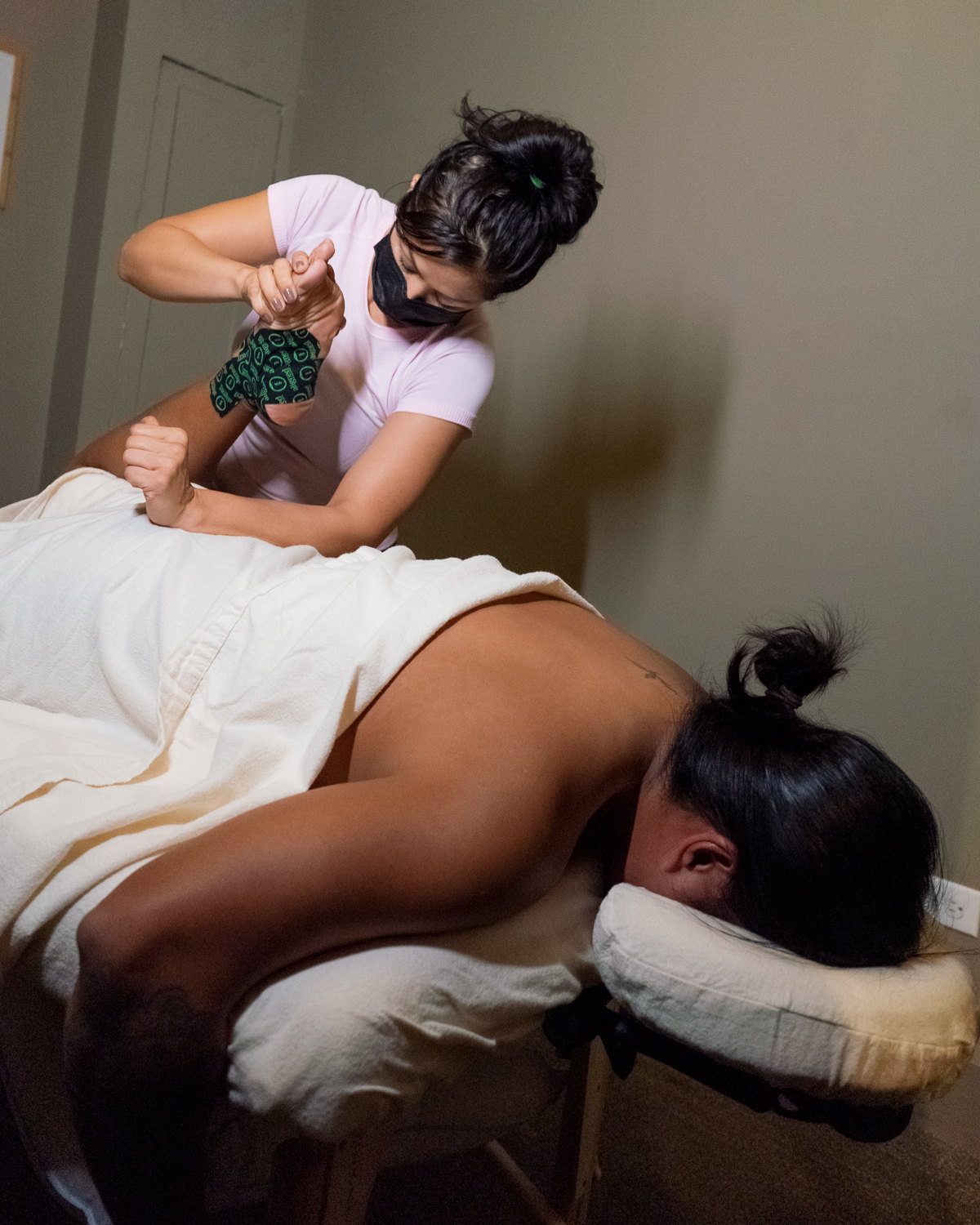
Q: How can one prep for the Big Day?
- Consider all the things you need for race day. Hopefully, you already have your race shoes ready. I would avoid running in a new pair. If you need to stop by Fleet Feet, get the exact same shoe, and break those in right away. Get all your nutrition ready. Don’t wait until the last minute to make your purchases because everyone else is trying to get ready too! Lay out all the things you need for race day. I love making my “flat runner”, which is laying out what I’m wearing, including my water bottle, and nutrition on a chair or the ground so I can see I have everything needed. It makes for a fun Instagram post too!
- Read the website and all communications! Know what to expect. Know when, where, and how you’re getting to the expo. Do you have everything you need to get your bib? Know the timeline of events, plan for when and how you’re getting to the race! The more knowledgeable you are, the more prepared you are, the less stress and anxiety you’ll have going into your big day!
Q: How can one physically prepare for the race?
- Hydrate – Make sure you’re hydrating all week long. Add a little pink salt into your water. Make sure you’re drinking at least half your body weight in ounces through out the week, and then a little more the days leading up to race day.
- Nutritious meals – Eat the rainbow! Make sure your meals are balanced with carbs, fats and proteins. Take all the crap out like excess sugar, fried foods, and fast food. Eat nutritiously and the days leading up to the marathon start increasing your carbs. You don’t have to do it just day the before in one meal. You can start slowly start increasing your carbs a couple days out. And again, add some Himalayan or sea salt to your meals. This will help with your hydration.
- Stay off your feet – Go into the race day as fresh as possible, but that doesn’t mean don’t do anything! Just don’t run in excess from what is on the schedule. Avoid being on your feet for long periods of time. And when you go to the expo, set a hard stop on time to leave. I know that the expo has a lot of cool things. It’s a candy store for runners! But have hard stop time. Go get your bib, visit the official race gear, visit your charity and/or training club, just don’t feel the need to visit every single booth. You’ll realize how tired you are when you get home if you do.
- Sleep – So important to really work on your sleep habit the weeks leading up to and the week of the marathon. It’s likely that you won’t be sleeping the day or two before because of all the excitement and nervous energy. So be sure to get rested well before then! Some quick tips – get off your digital devices an hour before sleep. Instead, read a book, spend some time talking with your family before you go to bed. Sleep in a dark room, as dark as you can possibly make it. Make your room cool, lower to mid-60’s in temperature. Avoid sugar and caffeine in the afternoon and eating too late. Try to have your last meal by 7 or 8pm.

Q: How can one plan to pace the race?
- If you’ve been training with a group, definitely discuss racing together! Everyone in the group can help keep pace easier than doing it alone. Also, the marathon has a number of pacers in each corral. Check the website and try to see where the pacers will be. My best races have been run with the official pacers. So if you can, stick with them. They will keep an even pace with just a few seconds off here and there. Unfortunately, you cannot change your corral now. However, trust your training. In the first mile, a lot of people will end up going fast. Hold back and stick to the pace you set out to do. Run your race.
Q: How to handle anxiety and stress?
- Look back at your training journal. If you have a Garmin, using Training Peaks, Strava or any training log, you can look back at all the miles and training days you’ve run. You can see a summary of everything you’ve done. You did it! Trust the training you put in and pat yourself on the back!
- Meditate and take a moment to breathe. Thank yourself, everyone that has supported you, and the powers that be for allowing you to be physically capable to be in this position. Gratitude and positive affirmation will help take away some of that stress. You can also go and get a massage, cupping, or acupuncture. A lot of us carry stress physically in our shoulders and neck. So having a professional like the one we have at Aligned Modern Health can help you relax.
- Prep for what can go wrong. A lot of stress we experience is the fear of what might go wrong. Think back to the 20-miler, to all the training during the season. What were some things that went wrong? Then make a plan so it doesn’t happen again, or if it does, know how you’ll counter that moment. Being prepared is a great resolution for stress.
- Distract yourself. Some of us, the moment is getting big. We just need to take our mind off it. Turn on a TV series you’ve been meaning to watch, visit some non-running friends and family. Take a walk-in nature. Catch a new movie, go see a comedy show. Laughter is a great way to distract yourself and take the stress off.
- Assign a friend or family member to be your point person of questions to the rest of your crew. For race day, if you’re rolling deep, the last thing you’ll want is to be the coordinator of everything. Ask a close friend or family member to be the point of all questions the week leading up to the race. You don’t want mom calling you the morning of asking where they should park.
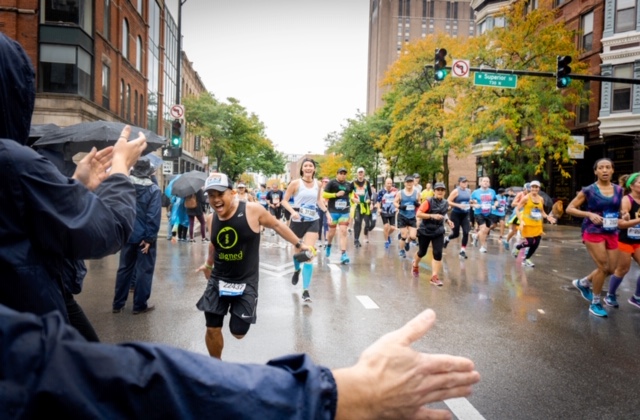
Q: What are some good mental strategies to incorporate?
- Remember why you’re doing this, who you are doing this for. That’s my favorite thing to ask people, “why did you sign up for this?” We all have a deep reason why. Remember that. You can even make up a Mantra if you don’t have one yet. The great endurance athlete and motivational speaker, David Goggins, talks about a “Cookie Jar”. It’s all the sweet stuff that YOU did in your life. When time gets tough, put your hand in that “Cookie Jar”, remind yourself that you are awesome and a bad A*%! You’ve done incredible things and you can do this too!
- Chunking up the race. 26.2 miles can seem daunting. So break it up in smaller, mentally digestible pieces. I like to break it into 5-5-5-5-3-3. After each segment, check in with yourself, and move onto thinking about then next segment.
- Pick distinct places to have your spectators to see them. It’s incredibly uplifting to see people you know. Tell them very specific places to be, on what side of the road you’ll be running. When I have spectators out there, I like to tell them one side and I stick to it. It feels good when people are cheering your name.
- Write your name on your running top! Use tape or letter stickers. Spectators will be cheering your name, even if they don’t know you.
- Enjoy the day! Remember, you chose to do this. Because you thought it would be cool to do, maybe because you saw others running it in the past. It’s one of the most joyful days on the calendar. It’s the biggest day of charity in Chicagoland, and strangers are cheering each other on. Simply enjoy the day and the moment. You’re running one of the greatest marathons in the world in one of the greatest cities in the world!
- Gratitude - Remember only a small percentage of people run marathons. Thank yourself for being physically able and a point in your life that allows you to be out there with 2 million spectators watching.
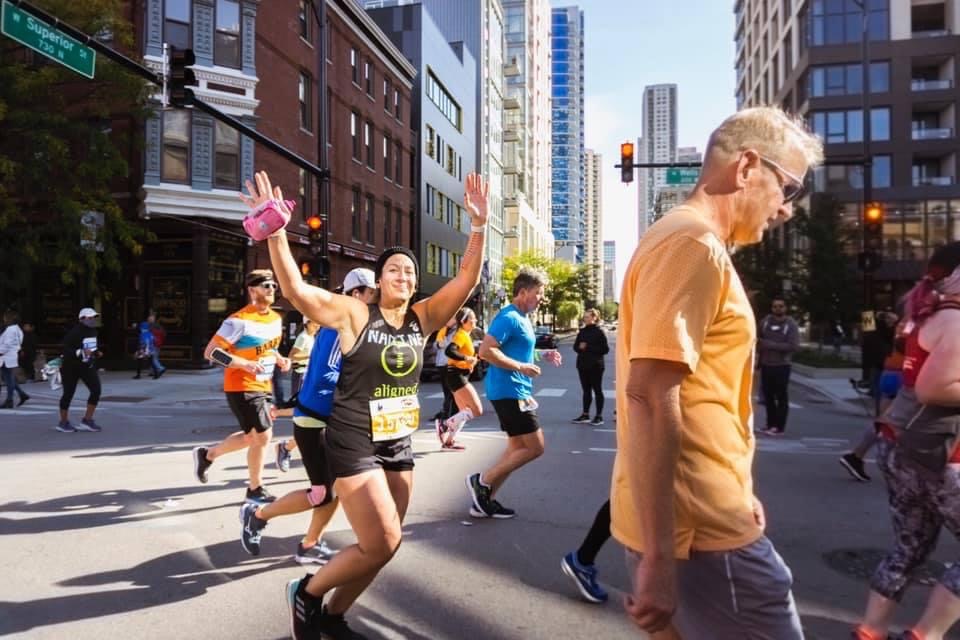
Q: How can we adapt to things if they go wrong?
- Let’s have some perspective here. Heads up, this is going to hurt! That’s not anything going wrong, that’s just the nature of running the marathon. Your shoes might not be bad, you are just running 26.2 miles. There’s a reason why not everyone runs marathons and there’s a reason why there is respect that goes with it. Know when things start to hurt, push through it! You got this!
- Plan for things that can go wrong. Again, if you look back to all your training days, when things went wrong, what did you do? Plan for the cold - dress in layers and be prepared to take them off to toss and lose forever, you don’t need to carry that long sleeve for the whole race. Plan for the heat - If it starts getting really hot, start splashing water on your head at the aid stations. Plan for cramping - carry salt tablets and maybe learn how to self-massage a cramp. Plan for your energy to take a dip – take caffeinated nutrition for later in the race, not early. It’s help you get a boost, and if you use caffeinated nutrition early, you’ll have to sustain taking that caffeine throughout the race. Then what happens if you have a dip in energy? Use caffeine late. If you have a coach, talk through all your possibilities, and have a plan to counteract when things go wrong.
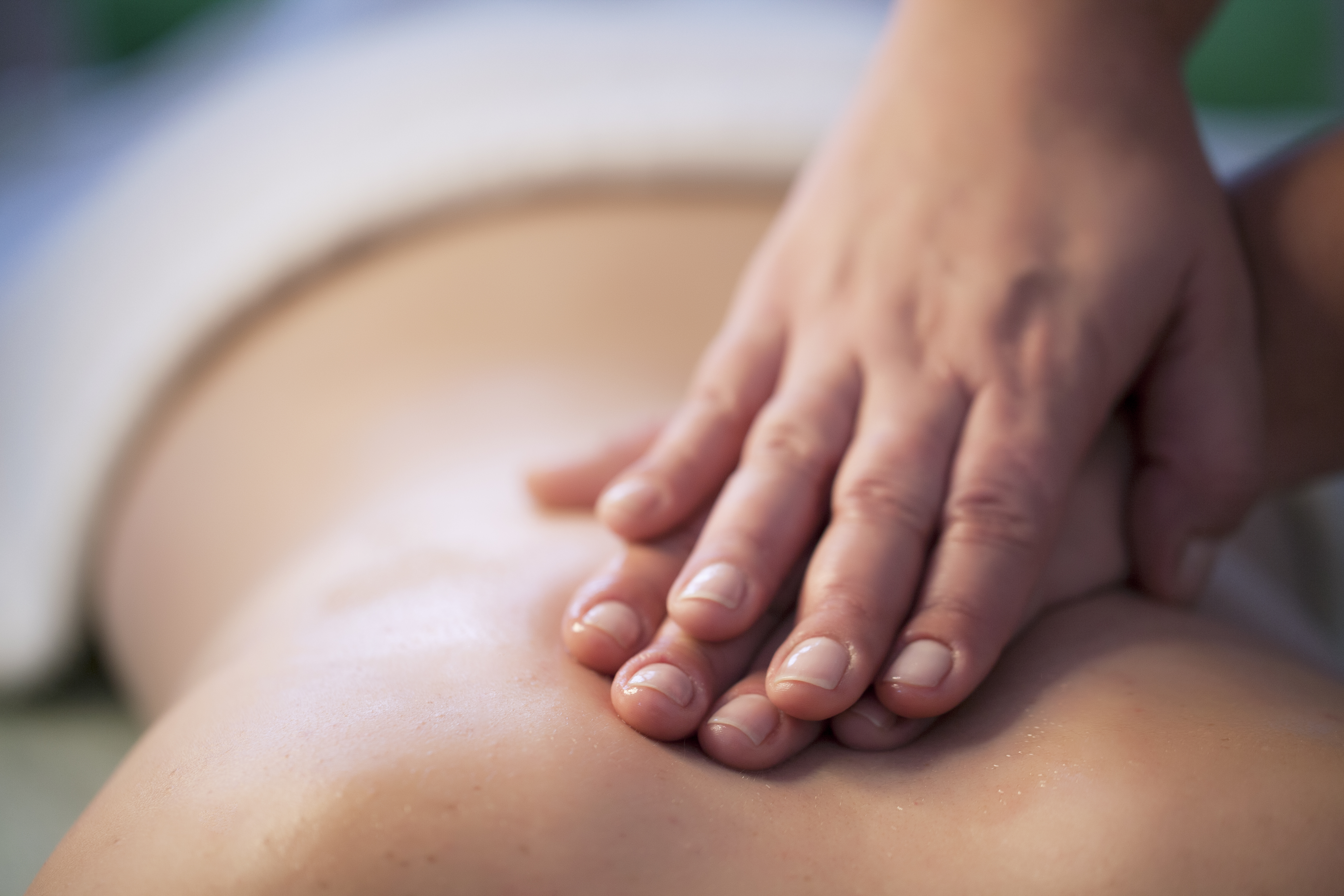
Q: Recovery – how should I treat post-run?
- Hydrate – drinking water throughout the day is key to recovery. Understandably, a lot of you will be putting down post-race beers. Go for it! You earned it. But don’t forget to drink water and lots of it.
- Move around – a big mistake I had when I ran my first marathon was gifting myself an awesome sectional couch. My friends and I didn’t get up for a while and became ridiculously stiff the next day. After the race, you’re going to want to sit, and that’s absolutely reasonable. But make plans to go out. Make restaurant reservations, plan a post party, all to get yourself out and about. Moving around will get the blood flowing, helping your recovery.
- Schedule a post-race recovery service! Most people will be too sensitive to the touch for an immediate post-race massage. I recommend scheduling one after a few days of recovery. I love getting cupping and acupuncture done too! Anything to help get the blood flowing will help with your recovery.
- Eat protein and carbs – make sure you’re eating soon after you are done. Chocolate milk is a great staple for recovery as it has a good ratio of carbs and protein. Again, plan a nice post-race meal with friends and family, and again for dinner.
- Celebrate
- Post about it. If you are social media friendly, this is the time to let your friends know about it. You just ran a marathon!
- Gratitude. Thank yourself for making the decision to run. It takes healthy habits to make it through a marathon. Maybe you weren’t perfect, but chances are, you made some good health choices to get you to run the marathon. Thank your friends and family who helped get you to the finish. It takes more than just you to accomplish a marathon. Don’t forget about all those people.
- Wear your medal everywhere! This is the day to do it! Some people will carry it around the week after. When should one stop wearing and/or carrying their medal? However long you want to! No one knows how proud you are that you accomplished this. No one knows the challenges you had to get there. This is all you, your day, your accomplishment. So if you want to have it with you all week, and at your work desk all year. Do it. You’ve earned it!
Ryan Caturan is a coache from Chicago Endurance Sports and Director of Community Partnerships for Aligned Modern Health.
Want more information? Reach out to Aligned Modern Health for functional medicine and nutrition support.
alignedmodernhealth.com
IG: @alignedmodernhealth
Connect With Us
See the latest from Fleet Feet Chicago